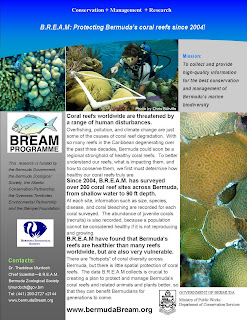Below are restored links to BREAM news articles in the Royal Gazette from 2000 to 2009 that were lost when the newspaper changed their website . Bermuda's reef healthy despite global warming coral reefs to continue thriving while others have succumbed to the effects of global warming and El Nino. DATE: May 22, 2000 Giving the ocean a medical A new project launched by the Bermuda Aquarium Museum and Zoo will help pinpoint the healthiest areas of the ocean that surround the Island. Today is World Oceans Day and along with the Bermuda Reef Ecosystem Assessment and Mapping (BREAM)... DATE: June 08, 2004 Bermuda could be a 'Noah's Ark' for reefs Bermuda's coral reefs are in such good shape compared to the Caribbean that they could be used as a "Noah's Ark" to re-populate destroyed reefs elsewhere. That was the positive news from Dr. Thad Murdoch of Bermuda Zoological Society (BZS), who is... DATE: July 01, 2008 Coral reefs are Bermuda's 'cr...


